Find Your Olive Leaf Private Label Contract Manufacturer
A practical guide to finding a quality Olive Leaf private label contract manufacturer. Learn to vet partners, navigate compliance, and launch your brand.
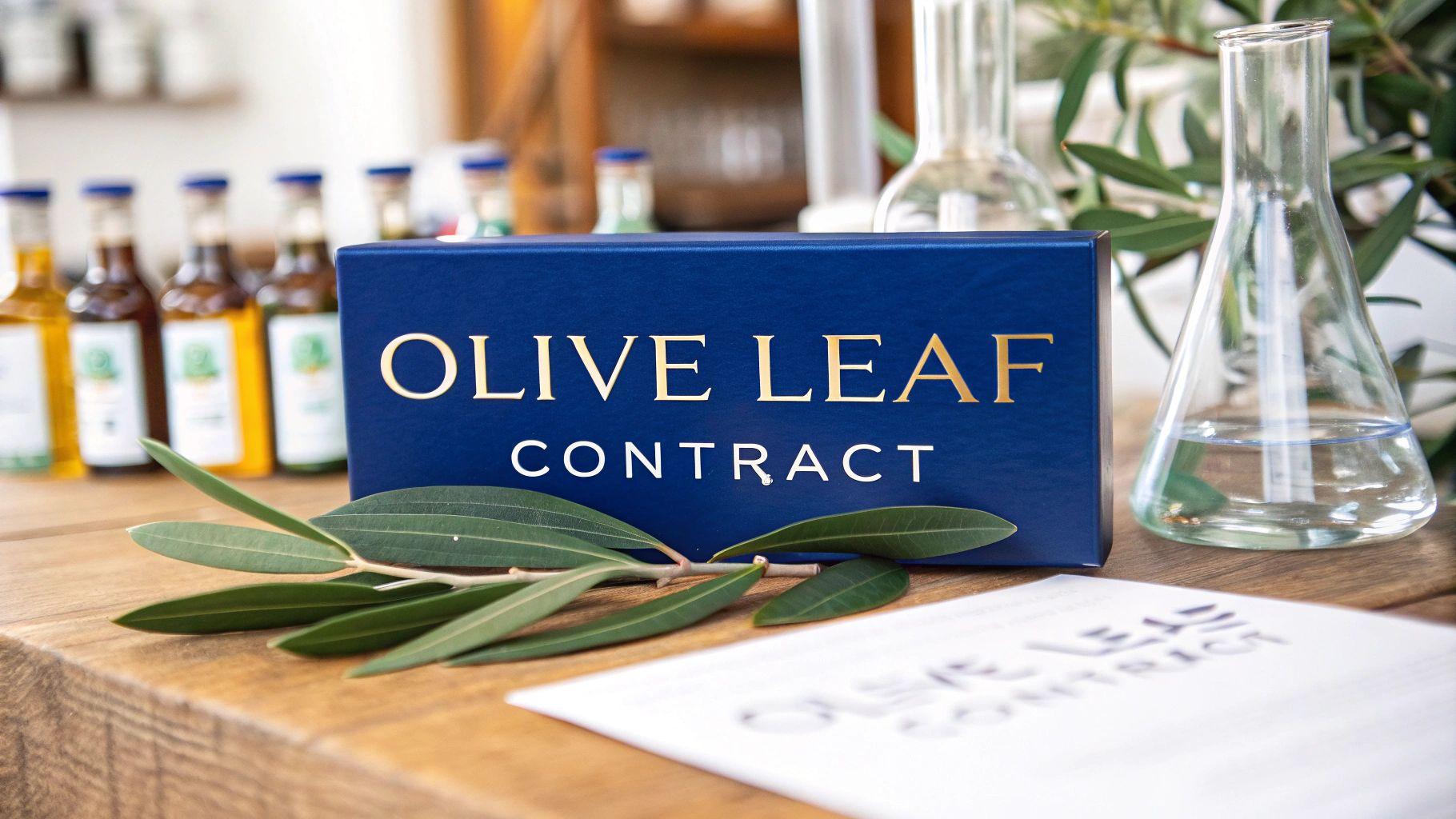 Get a Free Quote Today!
Get a Free Quote Today!Partnering with an Olive Leaf private label contract manufacturer is one of the most important decisions you'll make when launching your own supplement brand. Seriously. This single choice dominoes into everything else—product quality, whether you meet regulations, your brand's reputation, and ultimately, your profitability.
Think of it this way: choosing the right partner isn't just about production. It's about gaining an expert in formulation, sourcing, and manufacturing, which frees you up to do what you do best—build your business and connect with your customers.
Decoding The Olive Leaf Supplement Market
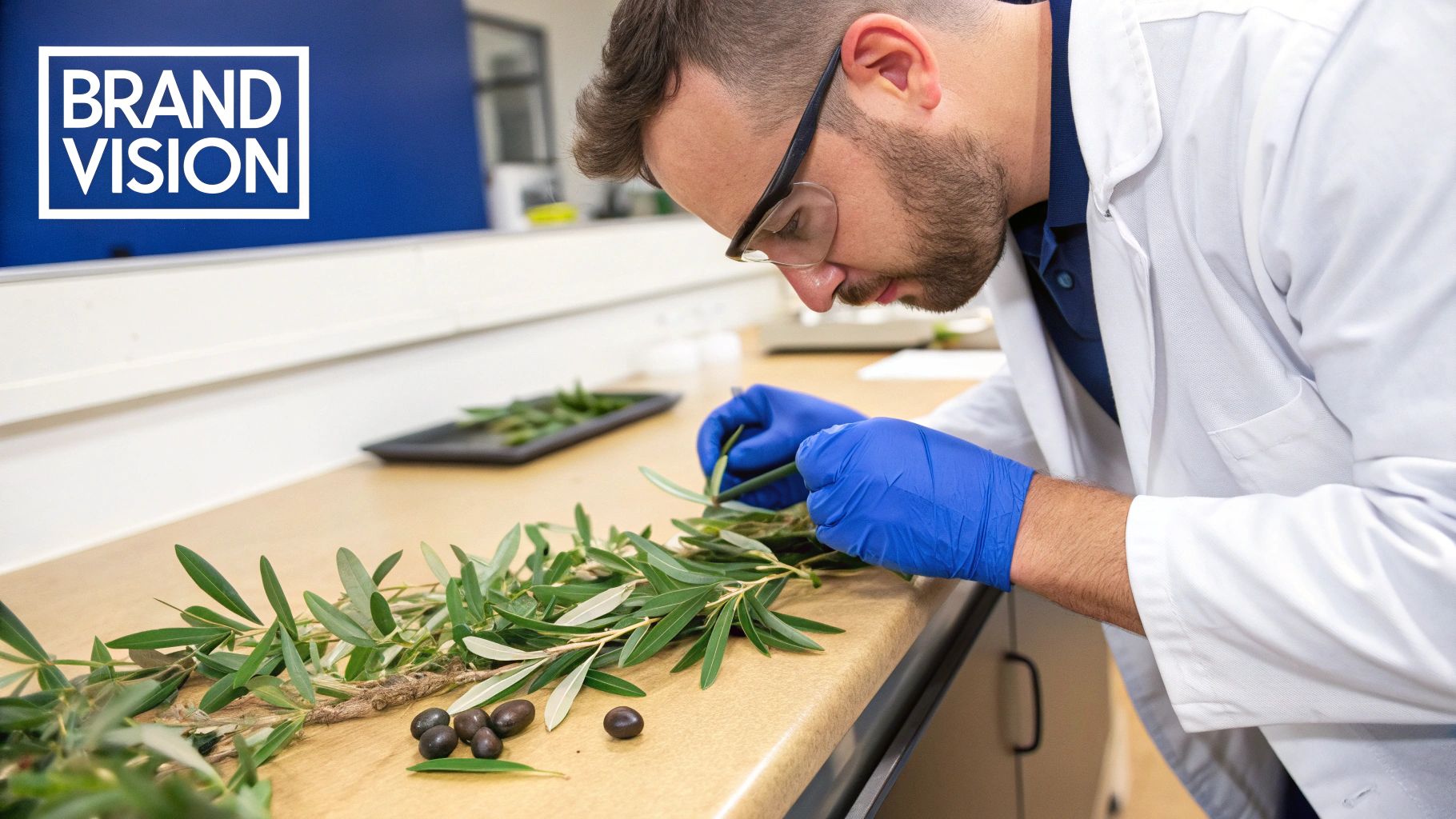
Before you even think about signing a contract, you need to get the lay of the land. The olive leaf supplement market isn't just some tiny, quiet corner of the wellness industry. It’s a dynamic and growing space, shaped by very specific consumer demands and industry pressures.
Knowing these factors inside and out is your secret weapon. It’s what will empower you to ask the tough, important questions and spot a manufacturer who truly gets it.
At its heart, the demand for olive leaf extract is riding a massive global wave toward natural, plant-based health solutions. Today's consumers are savvy. They’re skeptical of synthetic ingredients and actively hunt for products with clean labels and transparent sourcing. This is where olive leaf, with its deep roots in traditional medicine and potent antioxidant properties, really stands out.
Key Market Drivers And Consumer Trends
What's really pushing this market forward? A much more health-conscious consumer. People aren't just popping supplements anymore; they're making long-term investments in their health. This mindset has sparked a few key trends that should directly inform your product and your choice of a manufacturing partner.
- Purity and Potency are Non-Negotiable: Customers want proof. They need to know that the active compounds, like oleuropein, are present in concentrations that actually work.
- Transparency is the New Currency: People want the full story. Where did the olive leaves come from? How were they processed? Vague answers won't cut it.
- "Better-for-You" is a Baseline Expectation: Formulations that are non-GMO, organic, and allergen-free aren't just a bonus—they're becoming the standard for a huge part of the market.
These aren't just fluffy marketing points. They have real-world consequences for who you choose to work with. You need a partner who can not only hit these quality benchmarks but also hand you the documentation to back it all up.
Industry Insight: The global olive leaf extract market sees its share of ups and downs, often tied to supply chain hiccups and economic shifts. A powerful force driving new growth is Gen Z, a demographic with a strong preference for natural, "better-for-you" health products. For a deeper dive into these market forces, this comprehensive report on the olive leaf extract industry is a great resource.
Understanding The Supply Chain And Profitability
The long-term health of your business is tied directly to your manufacturer's ability to handle a tricky global supply chain. Sourcing olive leaves is an agricultural game, subject to the whims of crop yields, weather patterns, and big quality differences from one region to another. A truly great manufacturer won't just have one supplier; they'll have deep-rooted relationships with multiple, vetted growers to guarantee a steady stream of top-notch raw material.
This supply chain mastery has a direct impact on your bottom line. A partner with streamlined sourcing and efficient production can offer much more competitive pricing per unit, which is absolutely critical when you're just starting out. Getting a handle on these industry mechanics is the first real step toward building a supplement business that's not just profitable, but built to last.
Essential Criteria For Vetting Your Manufacturer
Picking the right olive leaf private label contract manufacturer is easily the most critical decision you'll make for your brand. This isn't just about production; it's about setting the entire foundation for your product's quality, efficacy, and reputation in a very competitive market. You have to move past the surface-level checks to find a genuine partner.
A manufacturer's capabilities directly impact where your product sits in the market. The global olive leaf powder market is expected to hit around $500 million by 2025 and is growing at a steady 7% CAGR through 2033. That growth means it's a lucrative space, but also a crowded one. To stand out, your product can't just be good—it needs to be exceptional. And that starts with who you choose to make it. For a deeper dive into the numbers, you can check out the full olive leaf powder market growth analysis.
This infographic gives you a bird's-eye view of the typical journey with a manufacturer, from the first conversation to the final delivery.
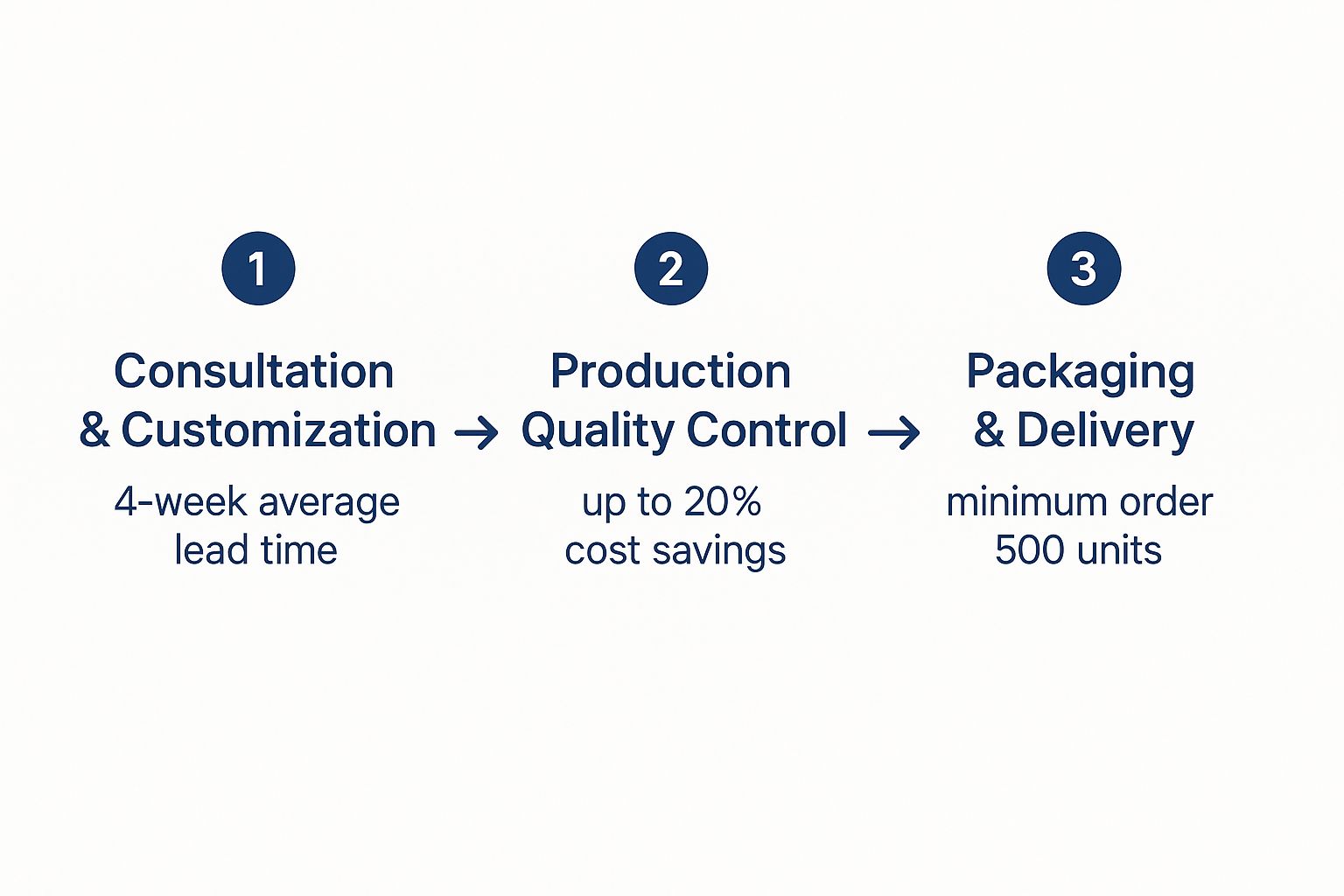
It highlights key metrics like average lead times and potential cost savings—all critical factors that should weigh heavily in your decision.
Beyond The Basics: Verifying True Quality
Every manufacturer you talk to will claim to have "high standards." Your job is to be the skeptic and dig for real proof.
Don't just ask if they're GMP-certified. That’s table stakes. Instead, ask to see their most recent audit report. This document gives you a much clearer, unvarnished look at their operational discipline and where they might have weaknesses.
The same goes for raw material sourcing. It's not enough to know where the olive leaves come from. You need to ask about their supplier verification program. How do they vet their farmers? What’s their contingency plan if a crop fails? A top-tier manufacturer will have a multi-supplier strategy to protect you from supply chain hiccups and ensure consistent quality.
Key Takeaway: The real difference between a good manufacturer and a great one is in the paperwork and transparency. A partner who willingly hands over audit reports, supplier protocols, and detailed batch records is a partner who is confident in their process.
To make this process more objective, I recommend using a scorecard. It forces you to compare each potential partner using the same criteria, removing emotion and gut feelings from the equation.
Manufacturer Vetting Scorecard
| Vetting Criterion | Manufacturer A | Manufacturer B | Manufacturer C | Notes |
|---|---|---|---|---|
| GMP Certification Verified? (Score 1-5) | Did they provide the cert and recent audit? | |||
| Raw Material Sourcing (Score 1-5) | Quality of suppliers, multi-sourcing strategy. | |||
| Extraction Method Expertise (Score 1-5) | Can they explain and justify their process? | |||
| Testing Protocols (CoA) (Score 1-5) | Did they provide a recent, detailed CoA? | |||
| Lead Times (Score 1-5) | How do their quoted times compare? | |||
| Pricing & MOQs (Score 1-5) | Are they competitive and flexible? | |||
| Responsiveness & Communication (Score 1-5) | How quickly and clearly do they respond? | |||
| Packaging Options (Score 1-5) | Do they offer the options your brand needs? | |||
| Total Score: |
By scoring each manufacturer, you get a much clearer picture of who is truly the best fit, not just the one with the slickest sales pitch.
Evaluating Extraction And Formulation Expertise
The extraction method is where the magic happens. It’s the process that pulls the active compounds, like oleuropein, from the olive leaf. This is not a detail to gloss over.
A potential partner should be able to clearly explain their extraction process—whether it's water, alcohol, or another method—and tell you why it's the best choice for preserving the potency and bioavailability of your final product. If they can't, it's a major red flag.
Get ready to drill down with some specific questions:
- What is your standard oleuropein percentage, and can you accommodate custom potency levels?
- Could you send over a Certificate of Analysis (CoA) for a recent batch of olive leaf extract you've produced?
- What systems do you have in place to ensure consistency from one production run to the next?
Their answers will quickly show you their level of technical expertise. A knowledgeable partner won't just take your order; they’ll guide you through these decisions to make sure your product is scientifically sound. If you want to get a better handle on the big picture, this guide on what to expect from nutraceutical contract manufacturing is a great resource. This kind of diligence is what builds a brand on a foundation of quality and trust from day one.
Diving Into Quality Control And Regulatory Compliance
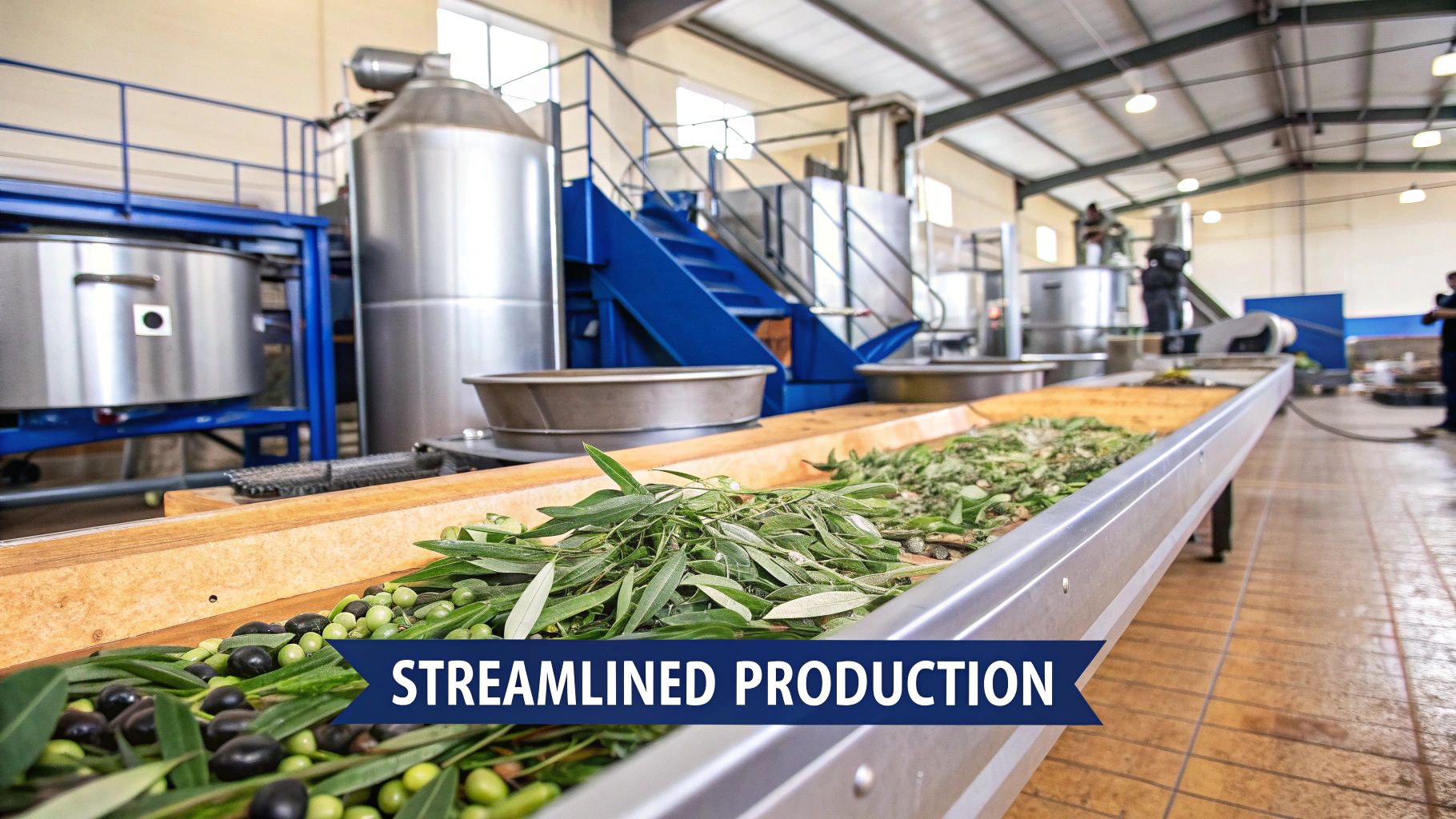
Let's be blunt: in the supplement world, compliance isn't just a hurdle. It's the entire foundation your brand's reputation is built on. Working with an Olive Leaf private label contract manufacturer who truly gets this protects you from serious legal headaches and, more importantly, builds the kind of trust that keeps customers coming back.
The first thing to look at is their quality system. Don't be timid here—you need to dig in. Any partner worth their salt will operate under the FDA's strict Good Manufacturing Practices (GMP), and they should be completely transparent about it. Ask to see their GMP certification, but don't stop there. Request their most recent audit results to get a real, unfiltered look at how they run their operation day-to-day.
Getting a Handle on the Certificate of Analysis
Every single conversation about quality should circle back to one critical document: the Certificate of Analysis (CoA). This is absolutely non-negotiable. A manufacturer must be able to provide a distinct CoA for every single batch of raw olive leaf extract that enters their facility.
Think of the CoA as a detailed report card for the raw material. It’s not just a formality. A comprehensive CoA from a trustworthy partner will verify a few key things:
- Identity: Is this actually olive leaf extract? The CoA confirms it.
- Potency: This tells you the exact percentage of active compounds, like the all-important oleuropein.
- Purity: It shows results from testing for nasty stuff you don't want, like heavy metals (lead, arsenic, mercury), microbial contaminants, and pesticides.
If a potential partner gives you a vague or incomplete CoA, consider it a massive red flag. This document is your proof that what you claim on your label is exactly what's inside the bottle.
Third-Party Testing and Allergen Protocols
While a manufacturer’s in-house testing is a good start, the best ones take quality a step further with third-party lab verification. This independent analysis confirms their own results, adding a vital layer of unbiased proof. Always ask potential partners if they send final products to third-party labs for testing and if you can see those reports.
Beyond purity and potency, you need to think about their allergen control program. Cross-contamination can destroy a brand overnight. A top-tier facility will have meticulously documented procedures for handling common allergens like soy, gluten, and dairy. This includes segregated storage areas and specific, verifiable cleaning protocols between production runs. You can get a better sense of how pure products are made by learning more about different herbal extraction methods and how they affect the final product's quality.
Contract manufacturing is a huge part of the growth we're seeing in the natural ingredients world. With over 50% of consumers now actively looking for eco-friendly and plant-based options, the demand for transparent, high-quality production has never been higher. This shift has even sparked a 40% increase in local manufacturing partnerships in some markets as brands try to cater to regional tastes.
Ultimately, a manufacturer's dedication to quality control says everything about their professionalism. And while getting the manufacturing side of compliance right is vital, don't forget that you also need to manage the rules for your marketing, like understanding SMS marketing compliance. A partner who is on top of every aspect of compliance isn't just a supplier; they're a protector of your brand's future.
Making Sense of Pricing and Minimum Order Quantities
The moment you start a conversation with a potential olive leaf private label contract manufacturer, the discussion will quickly turn to your finances. Two terms are going to pop up constantly: per-unit pricing and Minimum Order Quantities (MOQs). Getting a solid handle on these is absolutely essential for mapping out your startup costs and building a business that can actually last.
So, what are MOQs? They're simply the smallest number of units a manufacturer will agree to produce for you in one go. For a new brand, a high MOQ can feel like a huge hurdle. It means tying up a significant chunk of your cash in inventory before you've even made your first sale. On the flip side, a lower MOQ often means you'll pay more for each bottle, creating that classic tug-of-war between your upfront investment and your long-term profit margins.
Here's a real-world example: Let's say Manufacturer A has a nice, low MOQ of 500 bottles, but they're $10 a pop. That's a $5,000 bill. Manufacturer B, however, won't talk to you unless you order 2,000 bottles, but their price is just $7 per unit. That’s a $14,000 investment. The right choice here has everything to do with your starting capital, where you'll store the product, and how confident you are in your sales forecast.
What's Really in a Price Quote?
A good, transparent quote is never just one number. It should be a complete breakdown of every single cost that goes into getting your olive leaf supplement ready for your customers. You need to be ready to see a list of different line items, and you shouldn't be shy about asking what each one means.
Here are some of the common costs you'll run into:
- Per-Unit Cost: This is the base price to make one bottle of your supplement. This number should almost always go down as you order more.
- One-Time Setup Fees: Think of this as the cost to get the factory ready just for you. It covers creating your specific master manufacturing record, getting the equipment calibrated for your formula, and any initial lab work.
- Custom Formulation Fees: If you’re not just slapping your label on a stock formula, you can expect to pay for the R&D time needed to create your unique product.
- Packaging Costs: This is for the bottles, caps, inner seals, and boxes. If you opt for fancy or premium packaging, this part of the bill will go up.
- Label Printing and Application: Some manufacturers roll this into the unit price, but others will charge for it as a separate line item. It's always good to ask.
Negotiating Terms That Set You Up for Success
Don't ever treat the first quote you get as the final word. There's often wiggle room, especially if you show that you're serious about building a long-term partnership. When a quote lands in your inbox, take a fine-tooth comb to it and look for places where you can open a discussion.
For instance, it’s perfectly reasonable to ask if the setup fee can be reduced or even waived if you place a larger first order. Another smart move is to ask about their pricing tiers. A simple question like, "What would the per-unit cost look like at 1,000 units compared to 2,500 units?" gives you a crystal-clear map of their pricing. This helps you find that sweet spot that fits your budget without taking on too much inventory risk.
A quality olive leaf private label contract manufacturer wants your business for the long haul. They should be willing to have these conversations to find an arrangement that works for both of you.
Navigating Product Development and Sampling
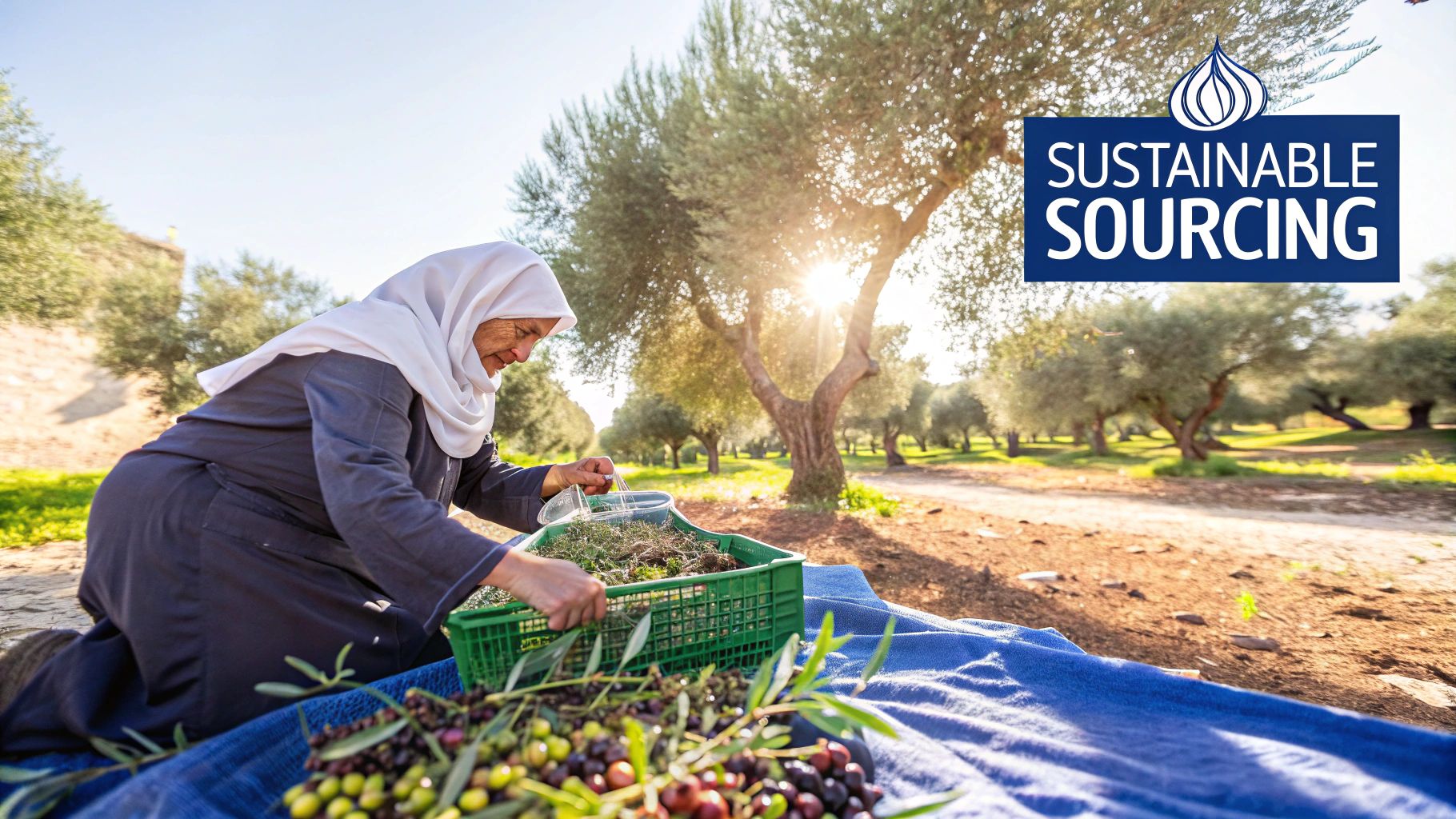
Alright, you've done the hard work of vetting and finally picking your Olive Leaf private label contract manufacturer. Now the real fun begins. This is where your idea leaps off the page and starts its journey to becoming a physical, market-ready supplement. It's a hands-on process that lives and dies by clear communication and a shared vision for the final product.
The first step is a deep dive into formulation. This isn't just you handing over a recipe. A truly great manufacturing partner will act more like a consultant, peppering you with questions to dial in your formula for the best possible efficacy, stability, and appeal. They might suggest tweaking the oleuropein levels to hit a specific health claim or recommend different excipients to give your product a longer, more stable shelf life.
Be ready to get into the weeds. The more you can tell them about who you're selling to and what you want the product to do, the better they can steer the formulation. This initial back-and-forth is absolutely crucial for getting the project started on the right foot and avoiding expensive do-overs later on.
The Make-or-Break Sampling Stage
Sampling is your first chance to see, touch, and taste what your customers will experience. Frankly, it’s the most important checkpoint in this whole process. Whatever you do, don't rush it.
Your manufacturer will create a small, lab-scale batch based on the formula you've discussed. This is your opportunity to put the product through its paces and evaluate the crucial stuff:
- Taste and Mouthfeel: Is it palatable? This is especially critical for liquid tinctures.
- Color and Clarity: Does it look like a pure, high-quality product?
- Aroma: Does the smell give off a natural, authentic olive leaf vibe?
It's completely normal to go through one to three rounds of sampling to get everything dialed in perfectly. Think of each round as a chance to provide sharp, constructive feedback.
Pro Tip: Specificity is your best friend here. Don't just say, "it tastes too strong." Instead, try something like, "The bitterness is a bit overwhelming. Can we look into a natural flavor masker that won't add any sugar?" Actionable feedback like this helps the lab team make precise tweaks.
Giving Feedback and The Final Sign-Off
Your feedback is the steering wheel. A good Olive Leaf private label manufacturer will not only expect your input but welcome it as a way to perfect the product. Once a sample finally checks all your boxes, you'll give them a final, written sign-off.
This approval is a big deal—it's the green light that locks in the formula for your first full production run.
As you get closer to launch, remember that the product itself is only part of the equation. Getting your online presence right is just as important. Investing in professional photo editing services for e-commerce can make all the difference, helping your olive leaf supplements look as premium online as they are in the bottle. Managing this entire process effectively from start to finish ensures the final product is a perfect reflection of your brand's commitment to quality.
Common Questions About Private Label Manufacturing
Even after you've done all your homework, a few last-minute questions always seem to surface right before you're ready to pull the trigger. These final details can feel like a lot, but getting them sorted out is what separates a smooth, successful partnership from a stressful, bumpy ride. Let’s walk through some of the most common questions that pop up when working with an Olive Leaf private label contract manufacturer.
What Kind Of Packaging And Labeling Support Can I Expect?
This is a big one, and the answer varies a lot between manufacturers. Most full-service partners will offer a good deal of support here. They can usually help you source bottles, jars, and pouches, and they should be able to guide you on creating a label that’s both eye-catching and FDA-compliant. That includes critical details like the supplement facts panel, net quantity statements, and the proper way to list ingredients.
However, the depth of that support can be a make-or-break detail. Some manufacturers have in-house designers you can hire for an additional fee, which can be a huge time-saver. Others will expect you to provide a completely print-ready file from your own designer.
Before you sign anything, get this clarified: who is ultimately responsible for the final proofread and regulatory review of your label? Missing this small step can lead to incredibly expensive reprints and serious compliance headaches down the road.
How Are Supply Chain And Raw Material Issues Handled?
A truly dependable manufacturer has their supply chain management locked down. You need to ask them about their specific policies for sourcing raw materials. Do they have a single go-to supplier for olive leaves, or do they maintain relationships with multiple, pre-vetted sources? For an agricultural product like olive leaf—where quality can swing with harvests and regional stability—this is absolutely critical for managing risk.
Follow that up by asking about their communication plan if a disruption happens. A transparent partner won’t hide bad news. They’ll be upfront about their backup plans and how they manage their raw material inventory to buffer against shortages. Ultimately, their ability to navigate the global supply chain directly impacts your ability to keep your product on the shelf.
Key Consideration: Formula ownership is a critical detail that needs to be crystal clear in your manufacturing agreement. Always have a legal professional review the terms related to intellectual property to protect your brand's future flexibility and assets.
Who Actually Owns The Final Product Formulation?
This is a fundamentally important question, and you need the answer spelled out in your contract. If you’re just starting out and decide to use one of the manufacturer’s existing “stock” or “white-label” formulas, they will almost always retain ownership of that intellectual property. Think of it as licensing their recipe for your brand.
But if you’re investing your own time and money into custom formulation—where the manufacturer creates a unique formula to your exact specifications—you should be negotiating for 100% ownership. It must be explicitly stated in the agreement. Owning your formula gives you the freedom to take it to another manufacturer if you outgrow your current partner or your business needs change. Don't leave this to chance.
What Is The Difference Between Liquids and Pills?
The delivery format you choose for your supplement is a major decision that influences everything from how well it's absorbed to who is most likely to buy it. It’s a common point of confusion for new brands.
- Liquids: These are often absorbed more quickly by the body. They also give your customers more flexibility with dosing and are a fantastic solution for anyone who struggles with swallowing pills.
- Pills/Capsules: On the other hand, capsules can be more convenient for on-the-go use, often have a longer shelf life, and are great for masking the naturally bitter taste of some ingredients like olive leaf.
There’s no single “best” answer. The right choice really comes down to your specific olive leaf formulation and the audience you're trying to reach. To get a much deeper dive into this topic, it's worth exploring the pros and cons of whether liquid vitamins are better than pills, as it can help you make a much more strategic decision for your brand.
Ready to turn your vision for a premium olive leaf supplement into a market-ready product? The team at Triton Nutra Group has the expertise and state-of-the-art facility to make it happen. We specialize in high-quality liquid supplements with transparent pricing and flexible options for brands of all sizes.